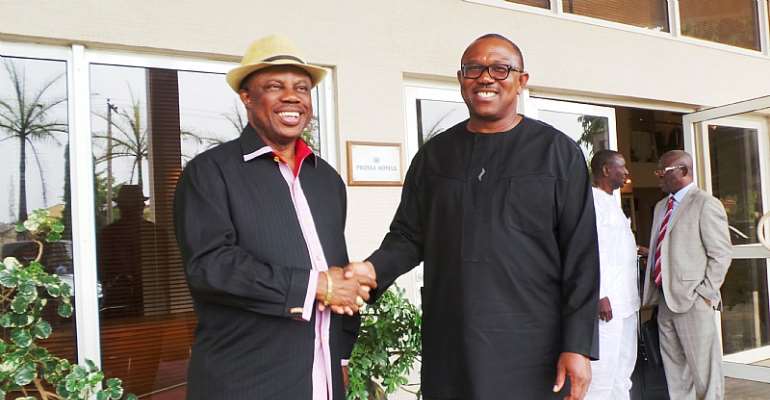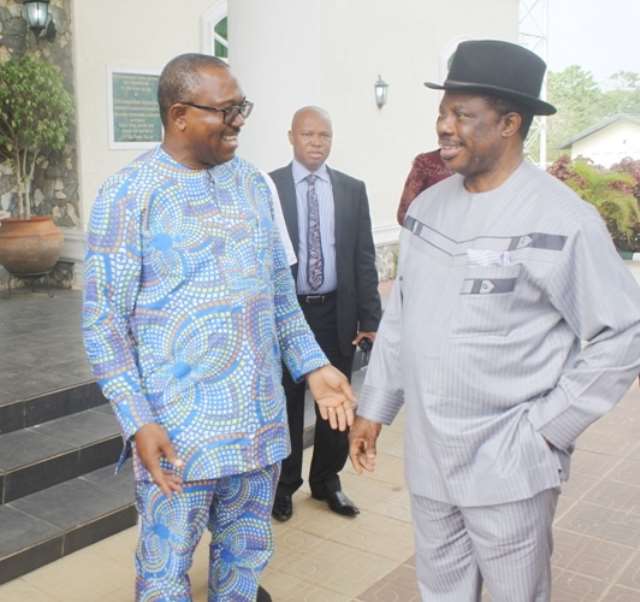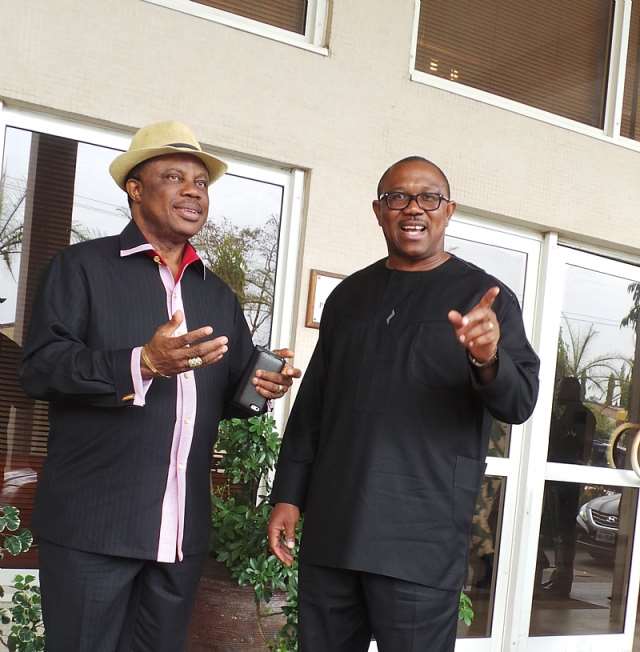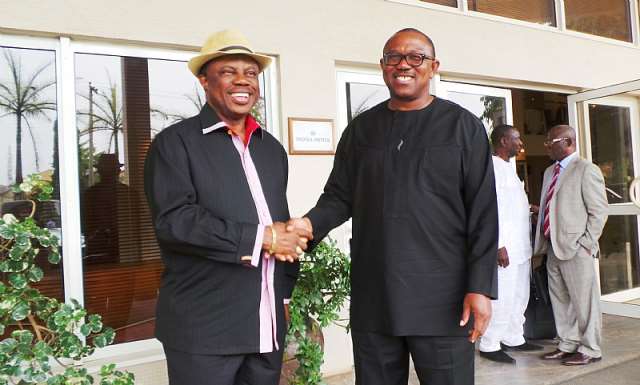From Obi to Obiano: Things Finally Fall together for Anambra

Famous thinker and writer, Chinua Achebe must have had his native Anambra in mind when in summing up his troubled relationship with Nigeria, he wrote; 'Nigeria is neither my mother nor my father. Nigeria is a child. Gifted, enormously talented, prodigiously endowed and incredibly wayward. Nigeria needs help. Nigerians have their work cut out for them - to coax this unruly child along the path of useful creative development. We are the parents of Nigeria, not vice versa.'
Watching the inauguration of the fourth democratically elected governor of Anambra State, Chief Willie Obiano, the other day, it seemed as though Ndi Anambra had finally understood what Achebe meant - it is unwise to look at one's nation-state or an internal administrative unit of a nation to which one belongs with paternal expectations. Rather, it is wise to treat it with the parental affection that binds a mother irrevocably to an autistic child, forcing her to nurse it through unbearable difficulties to healthy growth.
No event in living memory has drawn Anambra's illustrious sons and daughters together like Chief Willie Obiano's inauguration. Nor has any event quite symbolized the incremental progress of the people as the peaceful transfer of the instruments of state power from Obi to Obiano as witnessed at the Alex Ekweme Square on that day. And as though he had long anticipated the magnitude of the history that happened on that day, Chief Obiano acknowledged this progression in his Inaugural Address delivered in a voice that quavered with emotion, 'your clamour for continuity in Anambra State as captured in your slogans 'From Agulu to Aguleri' and 'from Obi to Obiano,' has finally been fulfilled!' In one fell swoop, the mantra 'from Obi to Obiano' made a swift transition from a mere campaign slogan to a metaphor for redemptive change; signifying not just a peaceful handover of power as had never before been experienced in the state but also a healing of historical and contemporary ego wounds; an acknowledgement of sorts that for society to remake itself, Obi must make way for Obiano.
For a people whose guiding philosophy abhors any form of inertia, the transition from Agulu to Aguleri and from Obi to Obiano was simply an idea fated to come.
The thing we must note about Chief Willie Obiano's inauguration though is that it was a theatre of symbols. The long rumoured rift between the immediate past governor, Chief Peter Obi and governor Obiano was laid to rest when Obi mounted the rostrum on that day, fully dressed in party colours with the image of Obiano's face boldly printed on it. The gesture was a symbolic rebuke of critics who had brazenly dismissed Obiano as governor Obi's stooge in the campaign days for wearing party clothes that had Obi's image on them. In wearing Obiano's image to Obiano's inauguration, Obi was silently telling hecklers who had ceaselessly probed for a chink in the armour of their friendship to look elsewhere and that he was fully behind the new governor. It was also a direct chastisement to many influence-peddlers and rumour mongers who had continued in their futile attempts to sow mistrust and bitterness between the two since the victorious end of the gubernatorial elections that produced the Obiano administration.
To many observers of Anambra's troubled political history, the insidious campaign to split these two great sons of Anambra does not come as a surprise though. Blessed beyond its wildest dreams with some of the greatest black people on the planet, Anambra has always been let down by the inability of her many gifted children to work together on political leadership. Venerable as Nnamdi Azikiwe was, his bitter disagreement with Chuba Okadigbo, leading to the placement of a purported curse on the latter is known to many people. So, the healthy relationship between Obi and Obiano in the build up to the latter's electoral victory had long been looked at with suspicion and curiosity. There have been countless insinuations of bad blood between the two, drip-feed into their closest circle of friends by people who see their growing friendship as a threat to their own political future.
But thankfully, the two have risen above the tide wash of poisonous gossip to chart a new future for Anambra State. They are fully aware, like many silent observers, that the delicate balance of things in Anambra depends on how well they manage their perceived differences. In what many people described as the perfect example of things falling together, Obi's statesmanlike carriage at Obiano's inauguration and timely assurances combined seamlessly with Obiano's cerebral US-style inaugural address to deliver a strong message of hope to Ndi Anambra. Hope, that finally, Anambra can reclaim the glory that rightly belongs to her, that the countless big egos that had often clashed to deny the state its place in the sun can be suppressed and that indeed, there can and should be only one 'king' at a time in Anambra State.
Finally, the people could see that APGA's campaign rhetoric of onye aghana nwanneya could indeed become a lived experience and that Chief Victor Umeh's brilliant deconstruction of the unwritten doctrine of power equation among Nigeria's contending tribes that stoked the fire of Igbo nationalism in the campaign days was not a fluke. Indeed, Umeh was as colourful as he was elemental during the campaign days, delivering peerless speeches laced with spicy anecdotes and emotional rhetoric from one campaign podium to another.
Interestingly, two weeks after his inauguration, Obiano seems to have finally erased all doubts about whether he could be his own man with a performance that has left no one in doubt about his competence and resolve to build on the legacy he has inherited. But perhaps more importantly, the first two weeks of the Obiano administration have shown rather more poignantly, that all anxieties about Obi's anticipated meddlesomeness in the new administration were indeed misplaced.
Observers have watched, fascinated by Obiano's pacey approach to governance since he was sworn in on March 17th 2014, reaching out to critical institutions of democracy in the state and taking bold steps to match his campaign promises with a concrete performance. Acutely aware that Anambra's future depends on the degree of freedom enjoyed by its citizens and that any real fight to reposition the state for greatness must begin with an effort to rid it of criminals, Chief Obiano had launched a Joint Task Force on Security two days after his inauguration. Made up of the police, the army, the navy and other para-military forces, the Joint Task Force has since swung into action with impressive results in Onitsha and environs. Obiano has also consulted broadly; charging royal fathers to gird their loins for an ethical rebirth of the state and reading riot acts to contractors handling various projects initiated by the previous administration to shape up or ship out.
He has also taken bold steps to shake things up in the state by making critical calls during his recent visit to Abuja. His meetings with the Inspector General of Police, Mr. Mohammed Abubakar, the Minister of Works, Mr. Mike Onolomemen and the Minister of Agriculture, Dr Akinwumi Adesina were all crucial engagements that would steady his steps in Anambra State.
Increasingly, it is becoming clearer to Ndi Anambra that the Obi to Obiano concept which among other things also signifies the balancing act that has finally given the three senatorial zones of the state a sense of equity and a fair chance at the centre, is a regenerative paradigm which the state needs to become what it has potentially been, these long years.
This probably explains why there is a pervading feeling of hope since Obiano's inauguration; a strong feeling that finally, things are beginning to fall together and in place for Anambra State. Perhaps, great things are finally here!
By James Eze ([email protected])

GOVERNOR OBIANO AND PETER OBI

OBI 2 OBIANO

OBI-OBIANO
